Ethical and Sustainable Customer Culture: A Comprehensive Analysis
VerifiedAdded on 2023/01/16
|11
|3164
|25
Essay
AI Summary
This paper presents a narrative literature review on ethical and sustainable customer culture, examining the growing importance of ethical consumption and sustainability in today's society. It explores the viewpoints on the definition of sustainability, ethical consumerism, and the relationship between ethical consumerism and cultural capital. The paper discusses customer choice criteria, the problems of ethics and sustainability in consumer society, and the implications of these factors on businesses and consumers. It highlights the importance of ethical practices, the influence of consumer choices, and the need for businesses to adopt sustainable models. The review covers topics such as dollar voting, ethical sourcing, and the impact of consumer habits on social hierarchies. It also touches on the role of cultural capital in ethical consumerism and the challenges of promoting ethical behavior in a consumerist society. The paper concludes by emphasizing the need for businesses to prioritize sustainability and ethical practices to meet the evolving expectations of consumers and contribute to a more sustainable future.
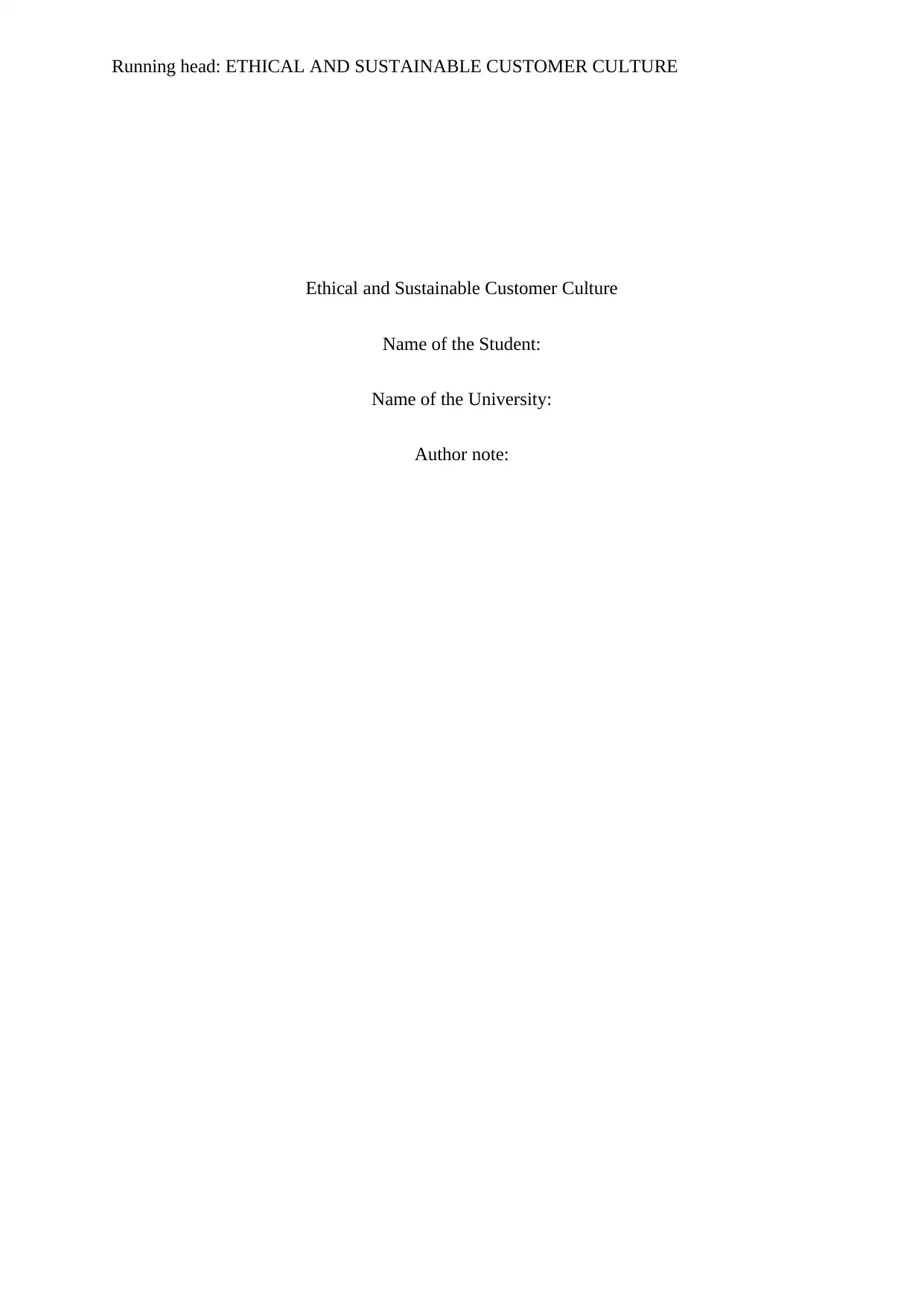
Running head: ETHICAL AND SUSTAINABLE CUSTOMER CULTURE
Ethical and Sustainable Customer Culture
Name of the Student:
Name of the University:
Author note:
Ethical and Sustainable Customer Culture
Name of the Student:
Name of the University:
Author note:
Paraphrase This Document
Need a fresh take? Get an instant paraphrase of this document with our AI Paraphraser
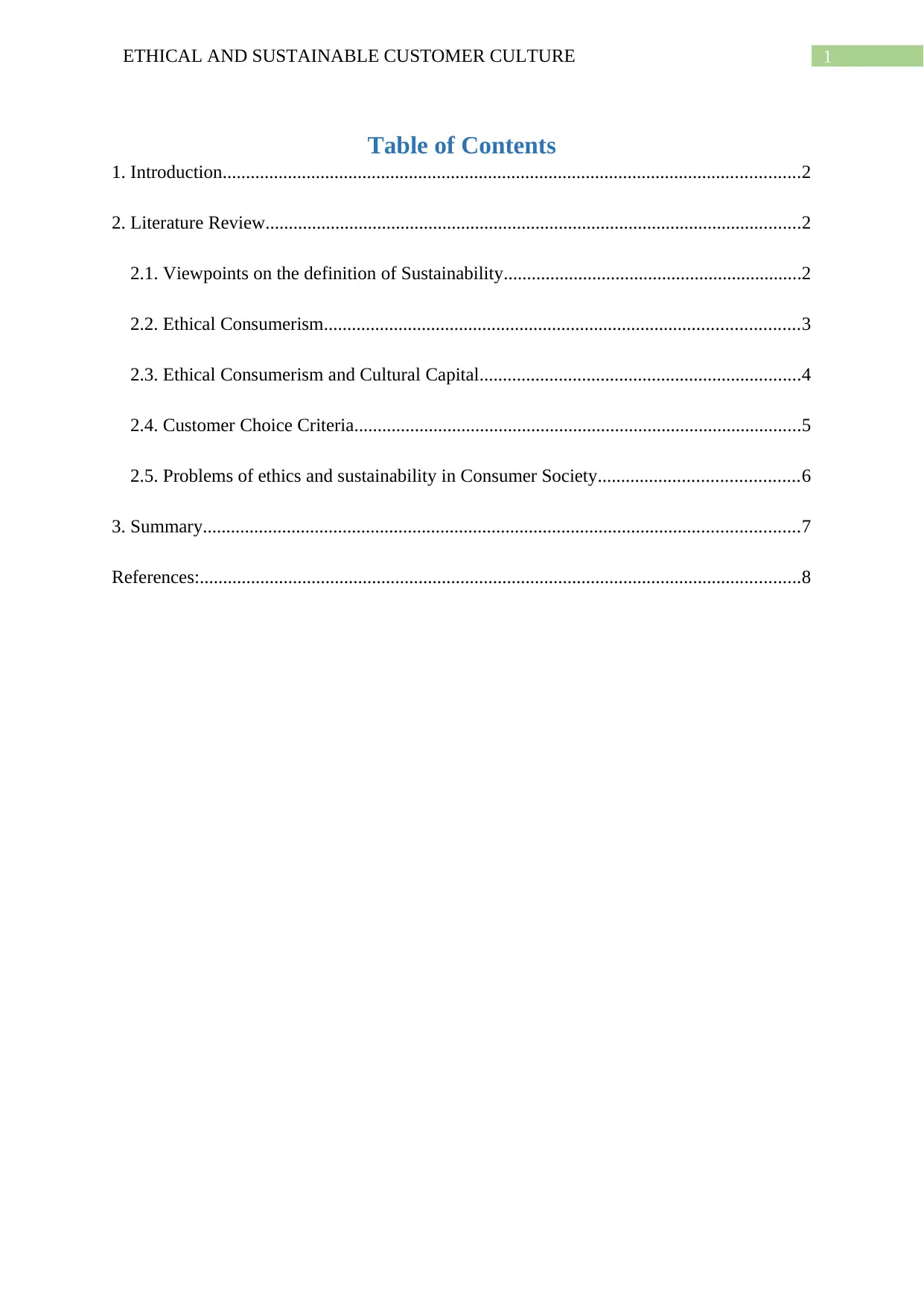
1ETHICAL AND SUSTAINABLE CUSTOMER CULTURE
Table of Contents
1. Introduction............................................................................................................................2
2. Literature Review...................................................................................................................2
2.1. Viewpoints on the definition of Sustainability................................................................2
2.2. Ethical Consumerism......................................................................................................3
2.3. Ethical Consumerism and Cultural Capital.....................................................................4
2.4. Customer Choice Criteria................................................................................................5
2.5. Problems of ethics and sustainability in Consumer Society...........................................6
3. Summary................................................................................................................................7
References:.................................................................................................................................8
Table of Contents
1. Introduction............................................................................................................................2
2. Literature Review...................................................................................................................2
2.1. Viewpoints on the definition of Sustainability................................................................2
2.2. Ethical Consumerism......................................................................................................3
2.3. Ethical Consumerism and Cultural Capital.....................................................................4
2.4. Customer Choice Criteria................................................................................................5
2.5. Problems of ethics and sustainability in Consumer Society...........................................6
3. Summary................................................................................................................................7
References:.................................................................................................................................8
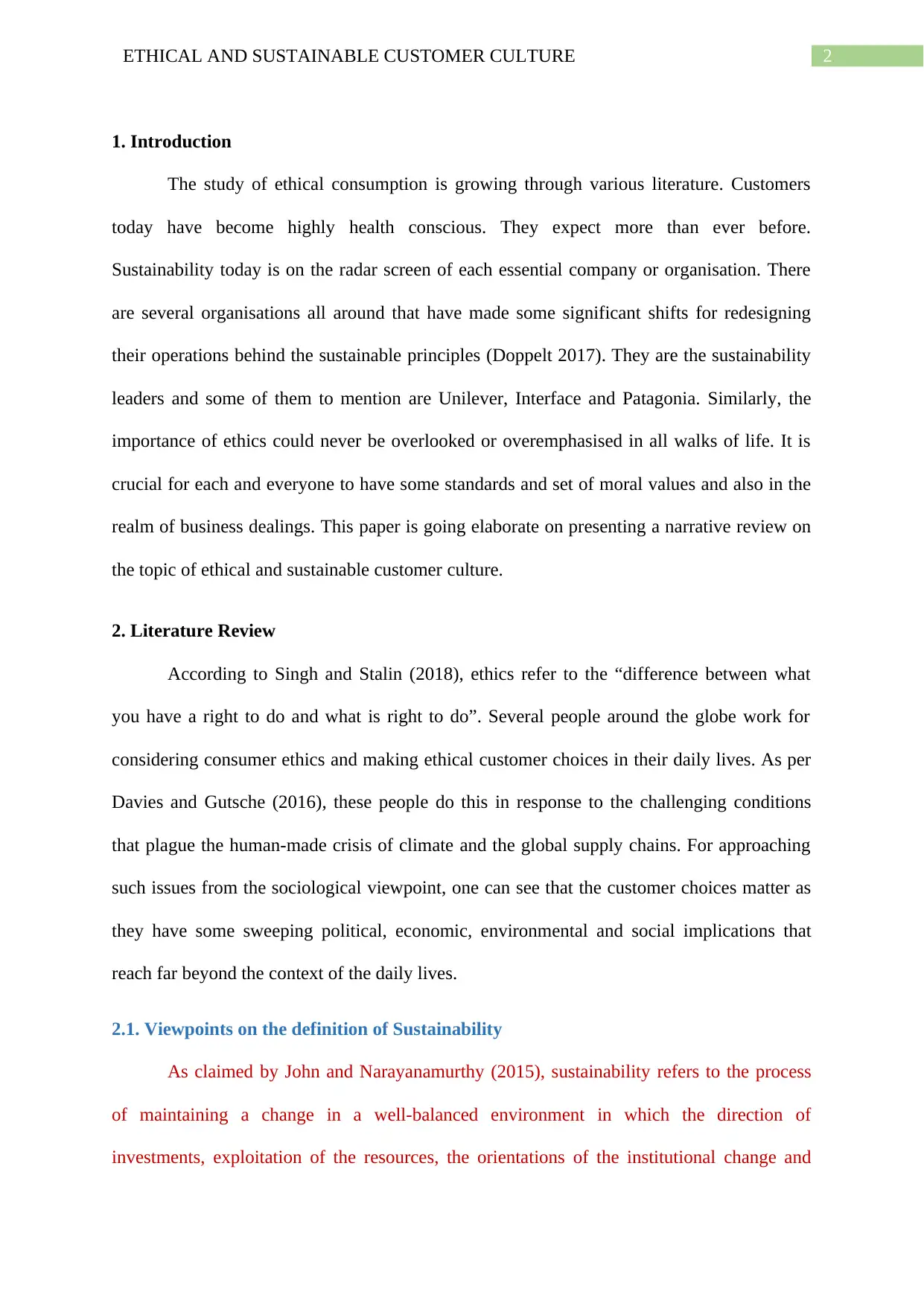
2ETHICAL AND SUSTAINABLE CUSTOMER CULTURE
1. Introduction
The study of ethical consumption is growing through various literature. Customers
today have become highly health conscious. They expect more than ever before.
Sustainability today is on the radar screen of each essential company or organisation. There
are several organisations all around that have made some significant shifts for redesigning
their operations behind the sustainable principles (Doppelt 2017). They are the sustainability
leaders and some of them to mention are Unilever, Interface and Patagonia. Similarly, the
importance of ethics could never be overlooked or overemphasised in all walks of life. It is
crucial for each and everyone to have some standards and set of moral values and also in the
realm of business dealings. This paper is going elaborate on presenting a narrative review on
the topic of ethical and sustainable customer culture.
2. Literature Review
According to Singh and Stalin (2018), ethics refer to the “difference between what
you have a right to do and what is right to do”. Several people around the globe work for
considering consumer ethics and making ethical customer choices in their daily lives. As per
Davies and Gutsche (2016), these people do this in response to the challenging conditions
that plague the human-made crisis of climate and the global supply chains. For approaching
such issues from the sociological viewpoint, one can see that the customer choices matter as
they have some sweeping political, economic, environmental and social implications that
reach far beyond the context of the daily lives.
2.1. Viewpoints on the definition of Sustainability
As claimed by John and Narayanamurthy (2015), sustainability refers to the process
of maintaining a change in a well-balanced environment in which the direction of
investments, exploitation of the resources, the orientations of the institutional change and
1. Introduction
The study of ethical consumption is growing through various literature. Customers
today have become highly health conscious. They expect more than ever before.
Sustainability today is on the radar screen of each essential company or organisation. There
are several organisations all around that have made some significant shifts for redesigning
their operations behind the sustainable principles (Doppelt 2017). They are the sustainability
leaders and some of them to mention are Unilever, Interface and Patagonia. Similarly, the
importance of ethics could never be overlooked or overemphasised in all walks of life. It is
crucial for each and everyone to have some standards and set of moral values and also in the
realm of business dealings. This paper is going elaborate on presenting a narrative review on
the topic of ethical and sustainable customer culture.
2. Literature Review
According to Singh and Stalin (2018), ethics refer to the “difference between what
you have a right to do and what is right to do”. Several people around the globe work for
considering consumer ethics and making ethical customer choices in their daily lives. As per
Davies and Gutsche (2016), these people do this in response to the challenging conditions
that plague the human-made crisis of climate and the global supply chains. For approaching
such issues from the sociological viewpoint, one can see that the customer choices matter as
they have some sweeping political, economic, environmental and social implications that
reach far beyond the context of the daily lives.
2.1. Viewpoints on the definition of Sustainability
As claimed by John and Narayanamurthy (2015), sustainability refers to the process
of maintaining a change in a well-balanced environment in which the direction of
investments, exploitation of the resources, the orientations of the institutional change and
⊘ This is a preview!⊘
Do you want full access?
Subscribe today to unlock all pages.

Trusted by 1+ million students worldwide
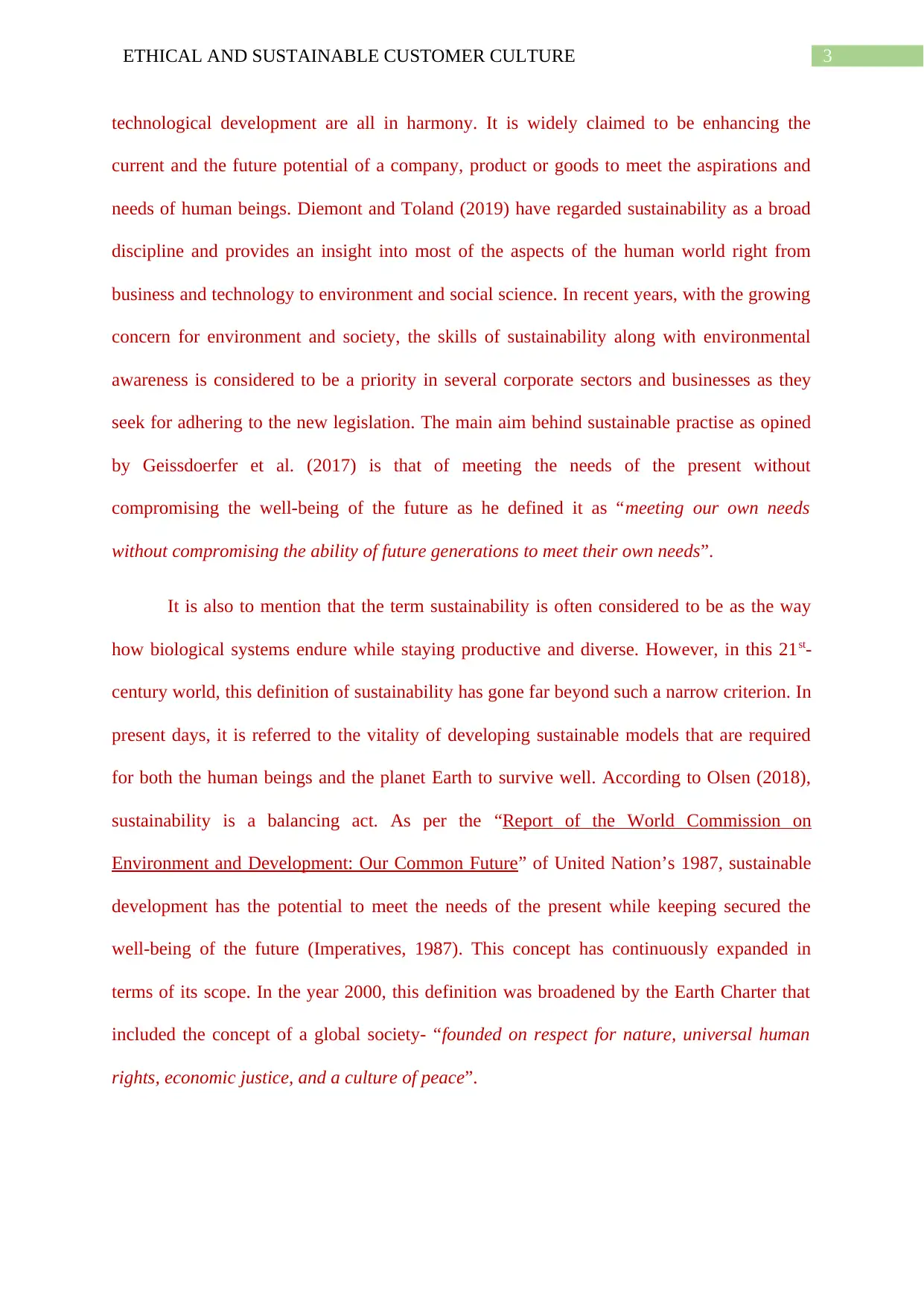
3ETHICAL AND SUSTAINABLE CUSTOMER CULTURE
technological development are all in harmony. It is widely claimed to be enhancing the
current and the future potential of a company, product or goods to meet the aspirations and
needs of human beings. Diemont and Toland (2019) have regarded sustainability as a broad
discipline and provides an insight into most of the aspects of the human world right from
business and technology to environment and social science. In recent years, with the growing
concern for environment and society, the skills of sustainability along with environmental
awareness is considered to be a priority in several corporate sectors and businesses as they
seek for adhering to the new legislation. The main aim behind sustainable practise as opined
by Geissdoerfer et al. (2017) is that of meeting the needs of the present without
compromising the well-being of the future as he defined it as “meeting our own needs
without compromising the ability of future generations to meet their own needs”.
It is also to mention that the term sustainability is often considered to be as the way
how biological systems endure while staying productive and diverse. However, in this 21st-
century world, this definition of sustainability has gone far beyond such a narrow criterion. In
present days, it is referred to the vitality of developing sustainable models that are required
for both the human beings and the planet Earth to survive well. According to Olsen (2018),
sustainability is a balancing act. As per the “Report of the World Commission on
Environment and Development: Our Common Future” of United Nation’s 1987, sustainable
development has the potential to meet the needs of the present while keeping secured the
well-being of the future (Imperatives, 1987). This concept has continuously expanded in
terms of its scope. In the year 2000, this definition was broadened by the Earth Charter that
included the concept of a global society- “founded on respect for nature, universal human
rights, economic justice, and a culture of peace”.
technological development are all in harmony. It is widely claimed to be enhancing the
current and the future potential of a company, product or goods to meet the aspirations and
needs of human beings. Diemont and Toland (2019) have regarded sustainability as a broad
discipline and provides an insight into most of the aspects of the human world right from
business and technology to environment and social science. In recent years, with the growing
concern for environment and society, the skills of sustainability along with environmental
awareness is considered to be a priority in several corporate sectors and businesses as they
seek for adhering to the new legislation. The main aim behind sustainable practise as opined
by Geissdoerfer et al. (2017) is that of meeting the needs of the present without
compromising the well-being of the future as he defined it as “meeting our own needs
without compromising the ability of future generations to meet their own needs”.
It is also to mention that the term sustainability is often considered to be as the way
how biological systems endure while staying productive and diverse. However, in this 21st-
century world, this definition of sustainability has gone far beyond such a narrow criterion. In
present days, it is referred to the vitality of developing sustainable models that are required
for both the human beings and the planet Earth to survive well. According to Olsen (2018),
sustainability is a balancing act. As per the “Report of the World Commission on
Environment and Development: Our Common Future” of United Nation’s 1987, sustainable
development has the potential to meet the needs of the present while keeping secured the
well-being of the future (Imperatives, 1987). This concept has continuously expanded in
terms of its scope. In the year 2000, this definition was broadened by the Earth Charter that
included the concept of a global society- “founded on respect for nature, universal human
rights, economic justice, and a culture of peace”.
Paraphrase This Document
Need a fresh take? Get an instant paraphrase of this document with our AI Paraphraser
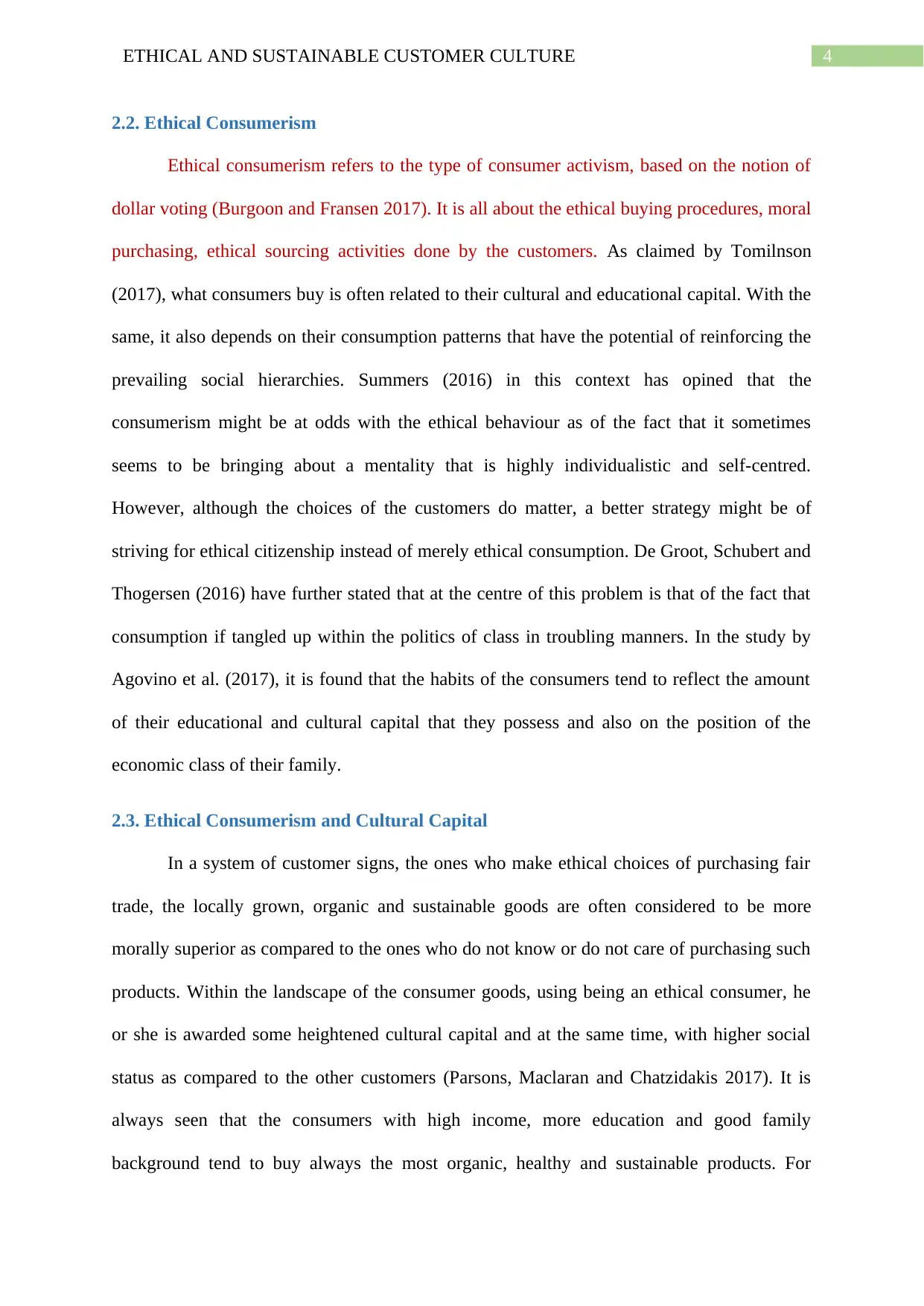
4ETHICAL AND SUSTAINABLE CUSTOMER CULTURE
2.2. Ethical Consumerism
Ethical consumerism refers to the type of consumer activism, based on the notion of
dollar voting (Burgoon and Fransen 2017). It is all about the ethical buying procedures, moral
purchasing, ethical sourcing activities done by the customers. As claimed by Tomilnson
(2017), what consumers buy is often related to their cultural and educational capital. With the
same, it also depends on their consumption patterns that have the potential of reinforcing the
prevailing social hierarchies. Summers (2016) in this context has opined that the
consumerism might be at odds with the ethical behaviour as of the fact that it sometimes
seems to be bringing about a mentality that is highly individualistic and self-centred.
However, although the choices of the customers do matter, a better strategy might be of
striving for ethical citizenship instead of merely ethical consumption. De Groot, Schubert and
Thogersen (2016) have further stated that at the centre of this problem is that of the fact that
consumption if tangled up within the politics of class in troubling manners. In the study by
Agovino et al. (2017), it is found that the habits of the consumers tend to reflect the amount
of their educational and cultural capital that they possess and also on the position of the
economic class of their family.
2.3. Ethical Consumerism and Cultural Capital
In a system of customer signs, the ones who make ethical choices of purchasing fair
trade, the locally grown, organic and sustainable goods are often considered to be more
morally superior as compared to the ones who do not know or do not care of purchasing such
products. Within the landscape of the consumer goods, using being an ethical consumer, he
or she is awarded some heightened cultural capital and at the same time, with higher social
status as compared to the other customers (Parsons, Maclaran and Chatzidakis 2017). It is
always seen that the consumers with high income, more education and good family
background tend to buy always the most organic, healthy and sustainable products. For
2.2. Ethical Consumerism
Ethical consumerism refers to the type of consumer activism, based on the notion of
dollar voting (Burgoon and Fransen 2017). It is all about the ethical buying procedures, moral
purchasing, ethical sourcing activities done by the customers. As claimed by Tomilnson
(2017), what consumers buy is often related to their cultural and educational capital. With the
same, it also depends on their consumption patterns that have the potential of reinforcing the
prevailing social hierarchies. Summers (2016) in this context has opined that the
consumerism might be at odds with the ethical behaviour as of the fact that it sometimes
seems to be bringing about a mentality that is highly individualistic and self-centred.
However, although the choices of the customers do matter, a better strategy might be of
striving for ethical citizenship instead of merely ethical consumption. De Groot, Schubert and
Thogersen (2016) have further stated that at the centre of this problem is that of the fact that
consumption if tangled up within the politics of class in troubling manners. In the study by
Agovino et al. (2017), it is found that the habits of the consumers tend to reflect the amount
of their educational and cultural capital that they possess and also on the position of the
economic class of their family.
2.3. Ethical Consumerism and Cultural Capital
In a system of customer signs, the ones who make ethical choices of purchasing fair
trade, the locally grown, organic and sustainable goods are often considered to be more
morally superior as compared to the ones who do not know or do not care of purchasing such
products. Within the landscape of the consumer goods, using being an ethical consumer, he
or she is awarded some heightened cultural capital and at the same time, with higher social
status as compared to the other customers (Parsons, Maclaran and Chatzidakis 2017). It is
always seen that the consumers with high income, more education and good family
background tend to buy always the most organic, healthy and sustainable products. For
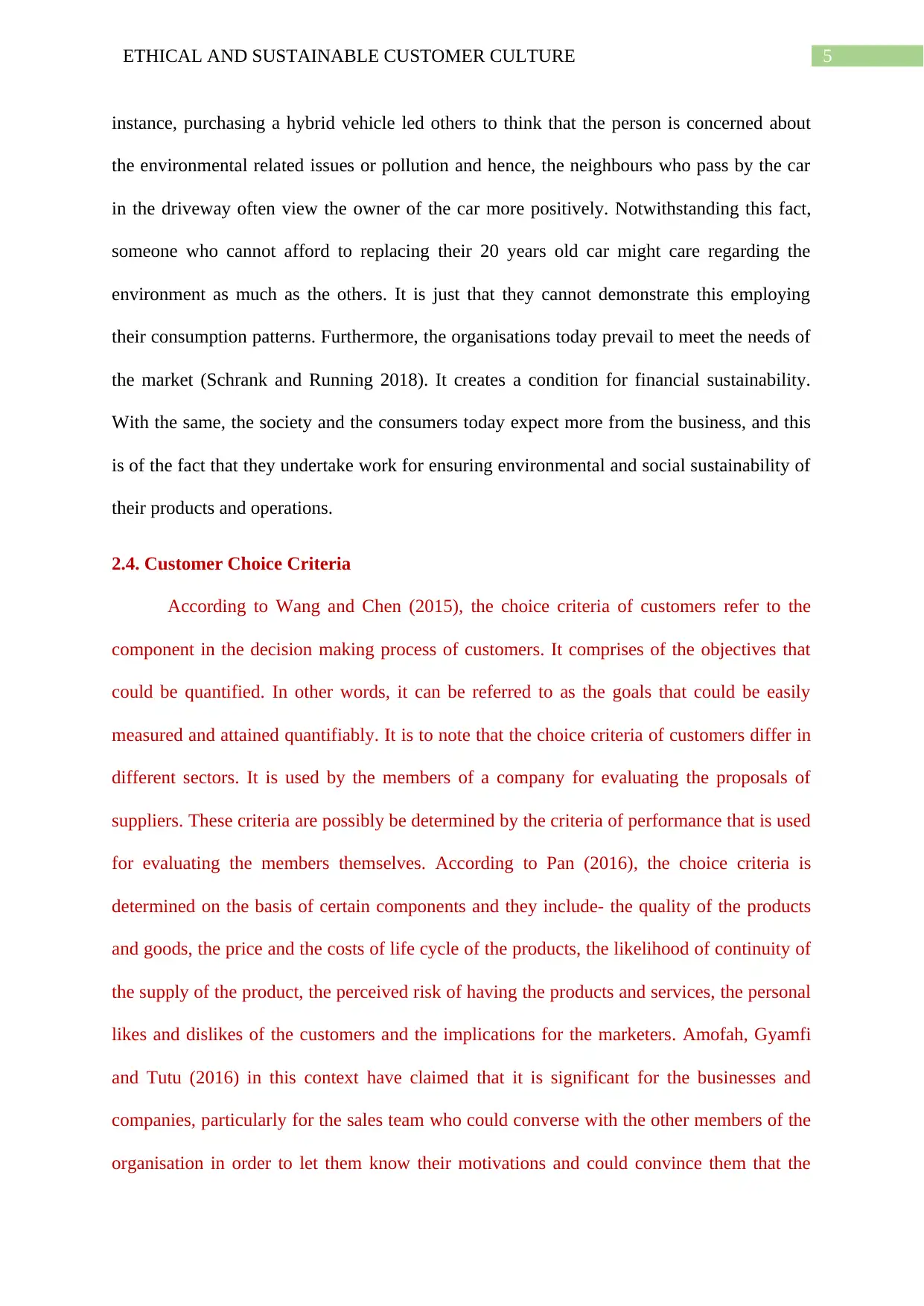
5ETHICAL AND SUSTAINABLE CUSTOMER CULTURE
instance, purchasing a hybrid vehicle led others to think that the person is concerned about
the environmental related issues or pollution and hence, the neighbours who pass by the car
in the driveway often view the owner of the car more positively. Notwithstanding this fact,
someone who cannot afford to replacing their 20 years old car might care regarding the
environment as much as the others. It is just that they cannot demonstrate this employing
their consumption patterns. Furthermore, the organisations today prevail to meet the needs of
the market (Schrank and Running 2018). It creates a condition for financial sustainability.
With the same, the society and the consumers today expect more from the business, and this
is of the fact that they undertake work for ensuring environmental and social sustainability of
their products and operations.
2.4. Customer Choice Criteria
According to Wang and Chen (2015), the choice criteria of customers refer to the
component in the decision making process of customers. It comprises of the objectives that
could be quantified. In other words, it can be referred to as the goals that could be easily
measured and attained quantifiably. It is to note that the choice criteria of customers differ in
different sectors. It is used by the members of a company for evaluating the proposals of
suppliers. These criteria are possibly be determined by the criteria of performance that is used
for evaluating the members themselves. According to Pan (2016), the choice criteria is
determined on the basis of certain components and they include- the quality of the products
and goods, the price and the costs of life cycle of the products, the likelihood of continuity of
the supply of the product, the perceived risk of having the products and services, the personal
likes and dislikes of the customers and the implications for the marketers. Amofah, Gyamfi
and Tutu (2016) in this context have claimed that it is significant for the businesses and
companies, particularly for the sales team who could converse with the other members of the
organisation in order to let them know their motivations and could convince them that the
instance, purchasing a hybrid vehicle led others to think that the person is concerned about
the environmental related issues or pollution and hence, the neighbours who pass by the car
in the driveway often view the owner of the car more positively. Notwithstanding this fact,
someone who cannot afford to replacing their 20 years old car might care regarding the
environment as much as the others. It is just that they cannot demonstrate this employing
their consumption patterns. Furthermore, the organisations today prevail to meet the needs of
the market (Schrank and Running 2018). It creates a condition for financial sustainability.
With the same, the society and the consumers today expect more from the business, and this
is of the fact that they undertake work for ensuring environmental and social sustainability of
their products and operations.
2.4. Customer Choice Criteria
According to Wang and Chen (2015), the choice criteria of customers refer to the
component in the decision making process of customers. It comprises of the objectives that
could be quantified. In other words, it can be referred to as the goals that could be easily
measured and attained quantifiably. It is to note that the choice criteria of customers differ in
different sectors. It is used by the members of a company for evaluating the proposals of
suppliers. These criteria are possibly be determined by the criteria of performance that is used
for evaluating the members themselves. According to Pan (2016), the choice criteria is
determined on the basis of certain components and they include- the quality of the products
and goods, the price and the costs of life cycle of the products, the likelihood of continuity of
the supply of the product, the perceived risk of having the products and services, the personal
likes and dislikes of the customers and the implications for the marketers. Amofah, Gyamfi
and Tutu (2016) in this context have claimed that it is significant for the businesses and
companies, particularly for the sales team who could converse with the other members of the
organisation in order to let them know their motivations and could convince them that the
⊘ This is a preview!⊘
Do you want full access?
Subscribe today to unlock all pages.

Trusted by 1+ million students worldwide
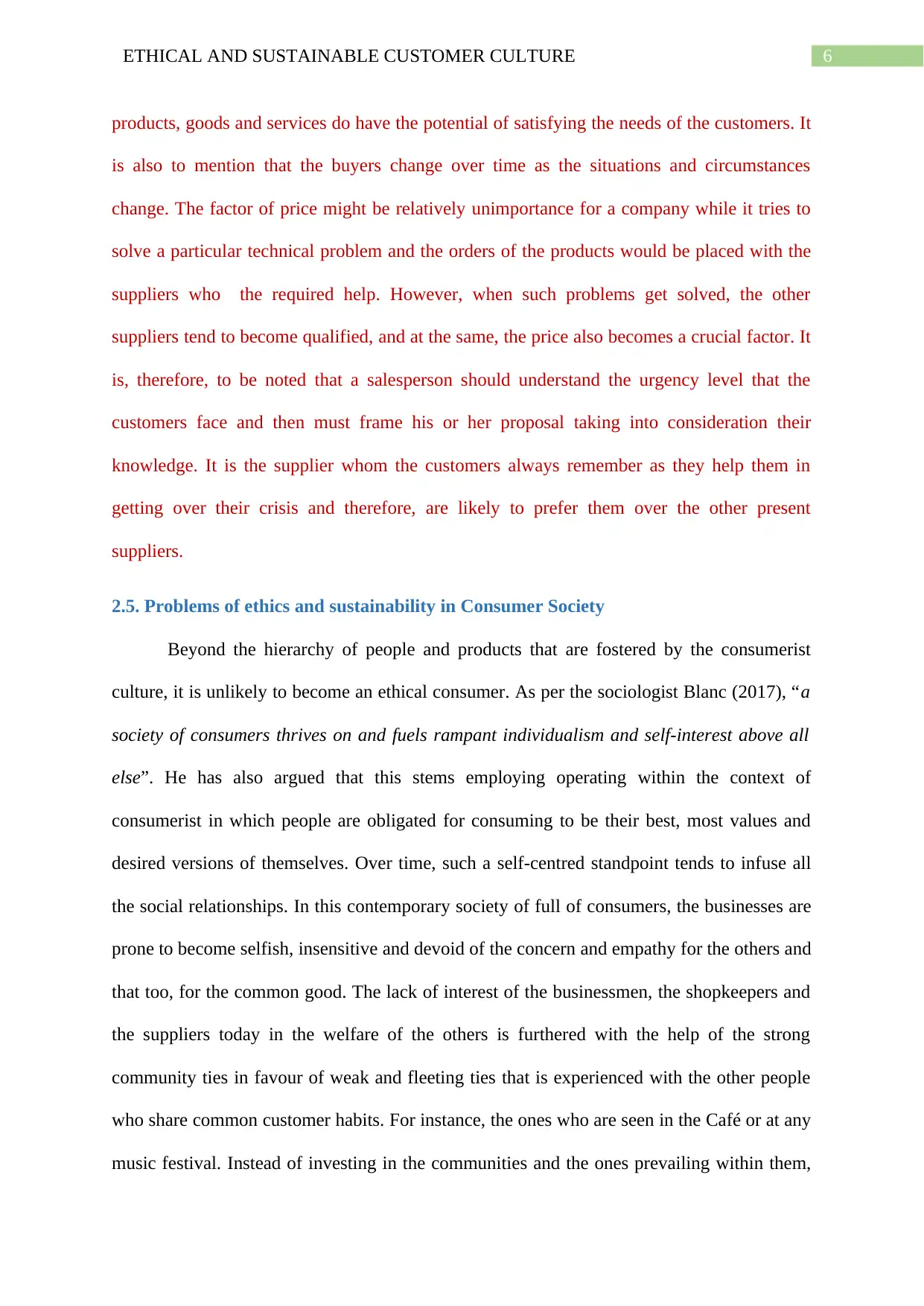
6ETHICAL AND SUSTAINABLE CUSTOMER CULTURE
products, goods and services do have the potential of satisfying the needs of the customers. It
is also to mention that the buyers change over time as the situations and circumstances
change. The factor of price might be relatively unimportance for a company while it tries to
solve a particular technical problem and the orders of the products would be placed with the
suppliers who the required help. However, when such problems get solved, the other
suppliers tend to become qualified, and at the same, the price also becomes a crucial factor. It
is, therefore, to be noted that a salesperson should understand the urgency level that the
customers face and then must frame his or her proposal taking into consideration their
knowledge. It is the supplier whom the customers always remember as they help them in
getting over their crisis and therefore, are likely to prefer them over the other present
suppliers.
2.5. Problems of ethics and sustainability in Consumer Society
Beyond the hierarchy of people and products that are fostered by the consumerist
culture, it is unlikely to become an ethical consumer. As per the sociologist Blanc (2017), “a
society of consumers thrives on and fuels rampant individualism and self-interest above all
else”. He has also argued that this stems employing operating within the context of
consumerist in which people are obligated for consuming to be their best, most values and
desired versions of themselves. Over time, such a self-centred standpoint tends to infuse all
the social relationships. In this contemporary society of full of consumers, the businesses are
prone to become selfish, insensitive and devoid of the concern and empathy for the others and
that too, for the common good. The lack of interest of the businessmen, the shopkeepers and
the suppliers today in the welfare of the others is furthered with the help of the strong
community ties in favour of weak and fleeting ties that is experienced with the other people
who share common customer habits. For instance, the ones who are seen in the Café or at any
music festival. Instead of investing in the communities and the ones prevailing within them,
products, goods and services do have the potential of satisfying the needs of the customers. It
is also to mention that the buyers change over time as the situations and circumstances
change. The factor of price might be relatively unimportance for a company while it tries to
solve a particular technical problem and the orders of the products would be placed with the
suppliers who the required help. However, when such problems get solved, the other
suppliers tend to become qualified, and at the same, the price also becomes a crucial factor. It
is, therefore, to be noted that a salesperson should understand the urgency level that the
customers face and then must frame his or her proposal taking into consideration their
knowledge. It is the supplier whom the customers always remember as they help them in
getting over their crisis and therefore, are likely to prefer them over the other present
suppliers.
2.5. Problems of ethics and sustainability in Consumer Society
Beyond the hierarchy of people and products that are fostered by the consumerist
culture, it is unlikely to become an ethical consumer. As per the sociologist Blanc (2017), “a
society of consumers thrives on and fuels rampant individualism and self-interest above all
else”. He has also argued that this stems employing operating within the context of
consumerist in which people are obligated for consuming to be their best, most values and
desired versions of themselves. Over time, such a self-centred standpoint tends to infuse all
the social relationships. In this contemporary society of full of consumers, the businesses are
prone to become selfish, insensitive and devoid of the concern and empathy for the others and
that too, for the common good. The lack of interest of the businessmen, the shopkeepers and
the suppliers today in the welfare of the others is furthered with the help of the strong
community ties in favour of weak and fleeting ties that is experienced with the other people
who share common customer habits. For instance, the ones who are seen in the Café or at any
music festival. Instead of investing in the communities and the ones prevailing within them,
Paraphrase This Document
Need a fresh take? Get an instant paraphrase of this document with our AI Paraphraser
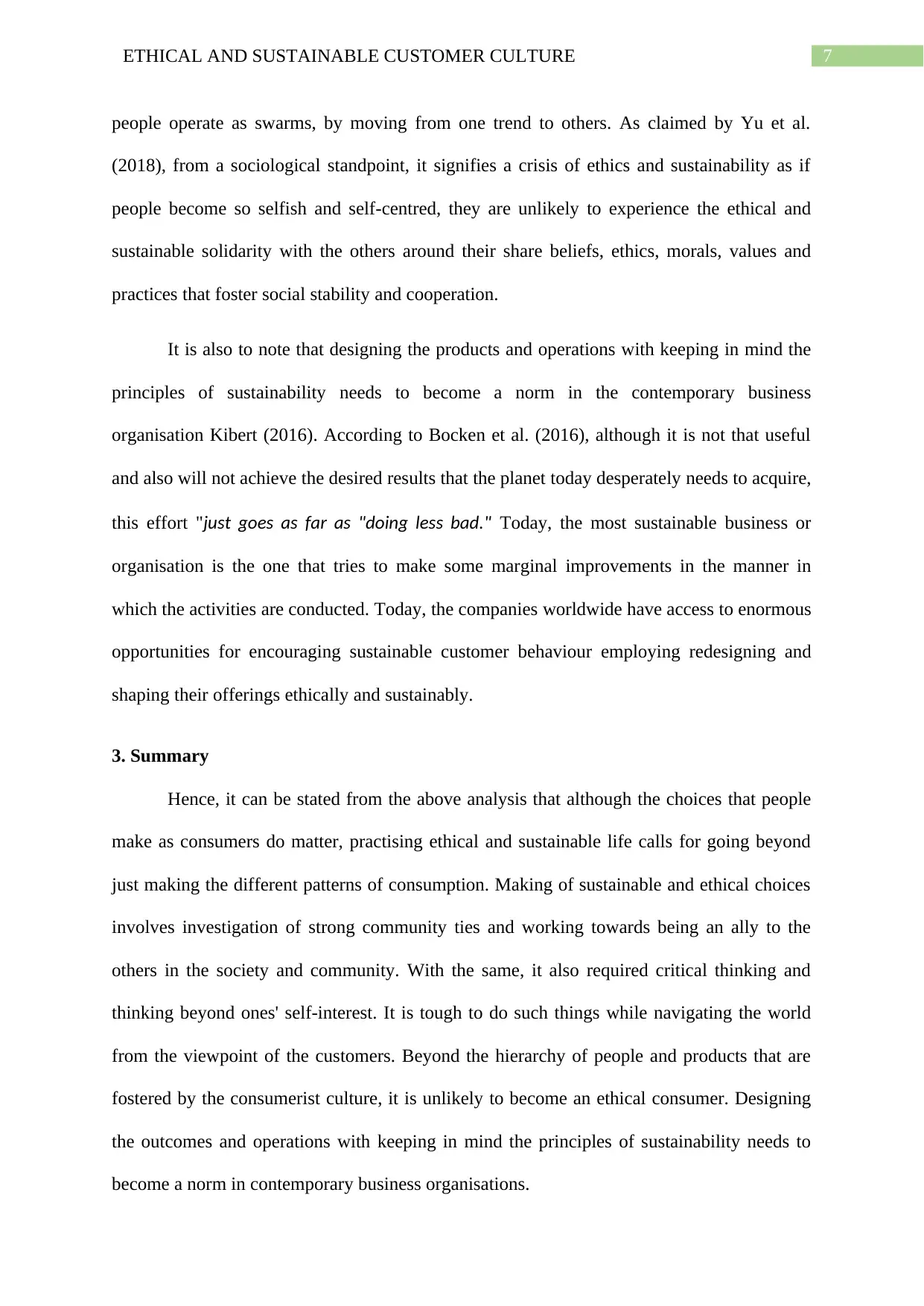
7ETHICAL AND SUSTAINABLE CUSTOMER CULTURE
people operate as swarms, by moving from one trend to others. As claimed by Yu et al.
(2018), from a sociological standpoint, it signifies a crisis of ethics and sustainability as if
people become so selfish and self-centred, they are unlikely to experience the ethical and
sustainable solidarity with the others around their share beliefs, ethics, morals, values and
practices that foster social stability and cooperation.
It is also to note that designing the products and operations with keeping in mind the
principles of sustainability needs to become a norm in the contemporary business
organisation Kibert (2016). According to Bocken et al. (2016), although it is not that useful
and also will not achieve the desired results that the planet today desperately needs to acquire,
this effort "just goes as far as "doing less bad." Today, the most sustainable business or
organisation is the one that tries to make some marginal improvements in the manner in
which the activities are conducted. Today, the companies worldwide have access to enormous
opportunities for encouraging sustainable customer behaviour employing redesigning and
shaping their offerings ethically and sustainably.
3. Summary
Hence, it can be stated from the above analysis that although the choices that people
make as consumers do matter, practising ethical and sustainable life calls for going beyond
just making the different patterns of consumption. Making of sustainable and ethical choices
involves investigation of strong community ties and working towards being an ally to the
others in the society and community. With the same, it also required critical thinking and
thinking beyond ones' self-interest. It is tough to do such things while navigating the world
from the viewpoint of the customers. Beyond the hierarchy of people and products that are
fostered by the consumerist culture, it is unlikely to become an ethical consumer. Designing
the outcomes and operations with keeping in mind the principles of sustainability needs to
become a norm in contemporary business organisations.
people operate as swarms, by moving from one trend to others. As claimed by Yu et al.
(2018), from a sociological standpoint, it signifies a crisis of ethics and sustainability as if
people become so selfish and self-centred, they are unlikely to experience the ethical and
sustainable solidarity with the others around their share beliefs, ethics, morals, values and
practices that foster social stability and cooperation.
It is also to note that designing the products and operations with keeping in mind the
principles of sustainability needs to become a norm in the contemporary business
organisation Kibert (2016). According to Bocken et al. (2016), although it is not that useful
and also will not achieve the desired results that the planet today desperately needs to acquire,
this effort "just goes as far as "doing less bad." Today, the most sustainable business or
organisation is the one that tries to make some marginal improvements in the manner in
which the activities are conducted. Today, the companies worldwide have access to enormous
opportunities for encouraging sustainable customer behaviour employing redesigning and
shaping their offerings ethically and sustainably.
3. Summary
Hence, it can be stated from the above analysis that although the choices that people
make as consumers do matter, practising ethical and sustainable life calls for going beyond
just making the different patterns of consumption. Making of sustainable and ethical choices
involves investigation of strong community ties and working towards being an ally to the
others in the society and community. With the same, it also required critical thinking and
thinking beyond ones' self-interest. It is tough to do such things while navigating the world
from the viewpoint of the customers. Beyond the hierarchy of people and products that are
fostered by the consumerist culture, it is unlikely to become an ethical consumer. Designing
the outcomes and operations with keeping in mind the principles of sustainability needs to
become a norm in contemporary business organisations.
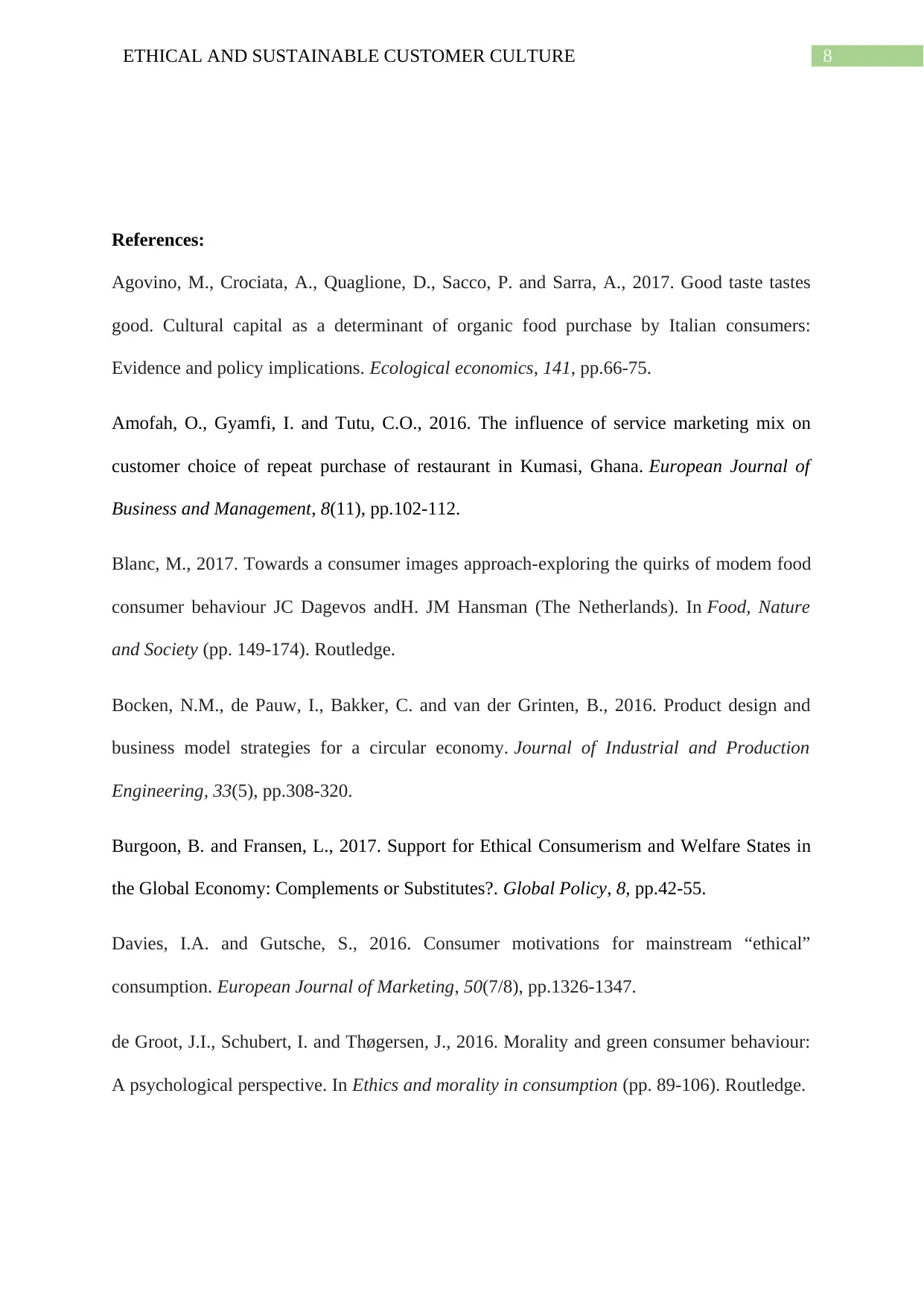
8ETHICAL AND SUSTAINABLE CUSTOMER CULTURE
References:
Agovino, M., Crociata, A., Quaglione, D., Sacco, P. and Sarra, A., 2017. Good taste tastes
good. Cultural capital as a determinant of organic food purchase by Italian consumers:
Evidence and policy implications. Ecological economics, 141, pp.66-75.
Amofah, O., Gyamfi, I. and Tutu, C.O., 2016. The influence of service marketing mix on
customer choice of repeat purchase of restaurant in Kumasi, Ghana. European Journal of
Business and Management, 8(11), pp.102-112.
Blanc, M., 2017. Towards a consumer images approach-exploring the quirks of modem food
consumer behaviour JC Dagevos andH. JM Hansman (The Netherlands). In Food, Nature
and Society (pp. 149-174). Routledge.
Bocken, N.M., de Pauw, I., Bakker, C. and van der Grinten, B., 2016. Product design and
business model strategies for a circular economy. Journal of Industrial and Production
Engineering, 33(5), pp.308-320.
Burgoon, B. and Fransen, L., 2017. Support for Ethical Consumerism and Welfare States in
the Global Economy: Complements or Substitutes?. Global Policy, 8, pp.42-55.
Davies, I.A. and Gutsche, S., 2016. Consumer motivations for mainstream “ethical”
consumption. European Journal of Marketing, 50(7/8), pp.1326-1347.
de Groot, J.I., Schubert, I. and Thøgersen, J., 2016. Morality and green consumer behaviour:
A psychological perspective. In Ethics and morality in consumption (pp. 89-106). Routledge.
References:
Agovino, M., Crociata, A., Quaglione, D., Sacco, P. and Sarra, A., 2017. Good taste tastes
good. Cultural capital as a determinant of organic food purchase by Italian consumers:
Evidence and policy implications. Ecological economics, 141, pp.66-75.
Amofah, O., Gyamfi, I. and Tutu, C.O., 2016. The influence of service marketing mix on
customer choice of repeat purchase of restaurant in Kumasi, Ghana. European Journal of
Business and Management, 8(11), pp.102-112.
Blanc, M., 2017. Towards a consumer images approach-exploring the quirks of modem food
consumer behaviour JC Dagevos andH. JM Hansman (The Netherlands). In Food, Nature
and Society (pp. 149-174). Routledge.
Bocken, N.M., de Pauw, I., Bakker, C. and van der Grinten, B., 2016. Product design and
business model strategies for a circular economy. Journal of Industrial and Production
Engineering, 33(5), pp.308-320.
Burgoon, B. and Fransen, L., 2017. Support for Ethical Consumerism and Welfare States in
the Global Economy: Complements or Substitutes?. Global Policy, 8, pp.42-55.
Davies, I.A. and Gutsche, S., 2016. Consumer motivations for mainstream “ethical”
consumption. European Journal of Marketing, 50(7/8), pp.1326-1347.
de Groot, J.I., Schubert, I. and Thøgersen, J., 2016. Morality and green consumer behaviour:
A psychological perspective. In Ethics and morality in consumption (pp. 89-106). Routledge.
⊘ This is a preview!⊘
Do you want full access?
Subscribe today to unlock all pages.

Trusted by 1+ million students worldwide
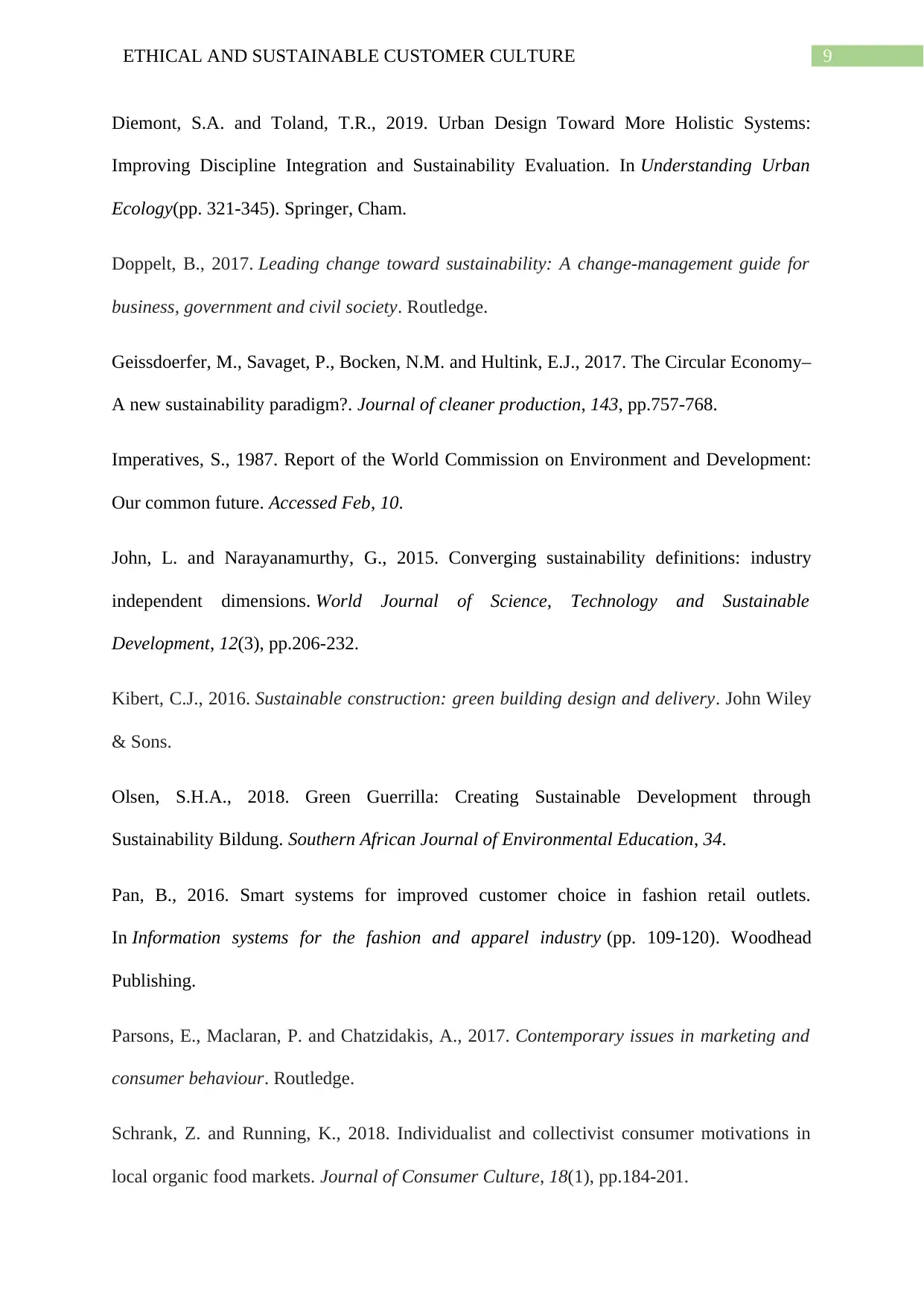
9ETHICAL AND SUSTAINABLE CUSTOMER CULTURE
Diemont, S.A. and Toland, T.R., 2019. Urban Design Toward More Holistic Systems:
Improving Discipline Integration and Sustainability Evaluation. In Understanding Urban
Ecology(pp. 321-345). Springer, Cham.
Doppelt, B., 2017. Leading change toward sustainability: A change-management guide for
business, government and civil society. Routledge.
Geissdoerfer, M., Savaget, P., Bocken, N.M. and Hultink, E.J., 2017. The Circular Economy–
A new sustainability paradigm?. Journal of cleaner production, 143, pp.757-768.
Imperatives, S., 1987. Report of the World Commission on Environment and Development:
Our common future. Accessed Feb, 10.
John, L. and Narayanamurthy, G., 2015. Converging sustainability definitions: industry
independent dimensions. World Journal of Science, Technology and Sustainable
Development, 12(3), pp.206-232.
Kibert, C.J., 2016. Sustainable construction: green building design and delivery. John Wiley
& Sons.
Olsen, S.H.A., 2018. Green Guerrilla: Creating Sustainable Development through
Sustainability Bildung. Southern African Journal of Environmental Education, 34.
Pan, B., 2016. Smart systems for improved customer choice in fashion retail outlets.
In Information systems for the fashion and apparel industry (pp. 109-120). Woodhead
Publishing.
Parsons, E., Maclaran, P. and Chatzidakis, A., 2017. Contemporary issues in marketing and
consumer behaviour. Routledge.
Schrank, Z. and Running, K., 2018. Individualist and collectivist consumer motivations in
local organic food markets. Journal of Consumer Culture, 18(1), pp.184-201.
Diemont, S.A. and Toland, T.R., 2019. Urban Design Toward More Holistic Systems:
Improving Discipline Integration and Sustainability Evaluation. In Understanding Urban
Ecology(pp. 321-345). Springer, Cham.
Doppelt, B., 2017. Leading change toward sustainability: A change-management guide for
business, government and civil society. Routledge.
Geissdoerfer, M., Savaget, P., Bocken, N.M. and Hultink, E.J., 2017. The Circular Economy–
A new sustainability paradigm?. Journal of cleaner production, 143, pp.757-768.
Imperatives, S., 1987. Report of the World Commission on Environment and Development:
Our common future. Accessed Feb, 10.
John, L. and Narayanamurthy, G., 2015. Converging sustainability definitions: industry
independent dimensions. World Journal of Science, Technology and Sustainable
Development, 12(3), pp.206-232.
Kibert, C.J., 2016. Sustainable construction: green building design and delivery. John Wiley
& Sons.
Olsen, S.H.A., 2018. Green Guerrilla: Creating Sustainable Development through
Sustainability Bildung. Southern African Journal of Environmental Education, 34.
Pan, B., 2016. Smart systems for improved customer choice in fashion retail outlets.
In Information systems for the fashion and apparel industry (pp. 109-120). Woodhead
Publishing.
Parsons, E., Maclaran, P. and Chatzidakis, A., 2017. Contemporary issues in marketing and
consumer behaviour. Routledge.
Schrank, Z. and Running, K., 2018. Individualist and collectivist consumer motivations in
local organic food markets. Journal of Consumer Culture, 18(1), pp.184-201.
Paraphrase This Document
Need a fresh take? Get an instant paraphrase of this document with our AI Paraphraser

10ETHICAL AND SUSTAINABLE CUSTOMER CULTURE
Singh, Z. and Stalin, P., 2018. Approval of the Institute Review Board, Ethics Committee and
Registering with the Clinical Trial Registry. Thesis Writing for Master's and Ph. D. Program,
pp.55-64.
Summers, N., 2016. Ethical consumerism in global perspective: A multilevel analysis of the
interactions between individual-level predictors and country-level affluence. Social
Problems, 63(3), pp.303-328.
Tomlinson, M., 2017. Student perceptions of themselves as ‘consumers’ of higher
education. British Journal of Sociology of Education, 38(4), pp.450-467.
Wang, M. and Chen, W., 2015. A data-driven network analysis approach to predicting
customer choice sets for choice modeling in engineering design. Journal of Mechanical
Design, 137(7), p.071410.
Yu, R., An, X., Jin, B., Shi, J., Move, O.A. and Liu, Y., 2018. Particle classification
optimization-based BP network for telecommunication customer churn prediction. Neural
Computing and Applications, 29(3), pp.707-720.
Singh, Z. and Stalin, P., 2018. Approval of the Institute Review Board, Ethics Committee and
Registering with the Clinical Trial Registry. Thesis Writing for Master's and Ph. D. Program,
pp.55-64.
Summers, N., 2016. Ethical consumerism in global perspective: A multilevel analysis of the
interactions between individual-level predictors and country-level affluence. Social
Problems, 63(3), pp.303-328.
Tomlinson, M., 2017. Student perceptions of themselves as ‘consumers’ of higher
education. British Journal of Sociology of Education, 38(4), pp.450-467.
Wang, M. and Chen, W., 2015. A data-driven network analysis approach to predicting
customer choice sets for choice modeling in engineering design. Journal of Mechanical
Design, 137(7), p.071410.
Yu, R., An, X., Jin, B., Shi, J., Move, O.A. and Liu, Y., 2018. Particle classification
optimization-based BP network for telecommunication customer churn prediction. Neural
Computing and Applications, 29(3), pp.707-720.
1 out of 11
Related Documents
Your All-in-One AI-Powered Toolkit for Academic Success.
+13062052269
info@desklib.com
Available 24*7 on WhatsApp / Email
![[object Object]](/_next/static/media/star-bottom.7253800d.svg)
Unlock your academic potential
Copyright © 2020–2026 A2Z Services. All Rights Reserved. Developed and managed by ZUCOL.





